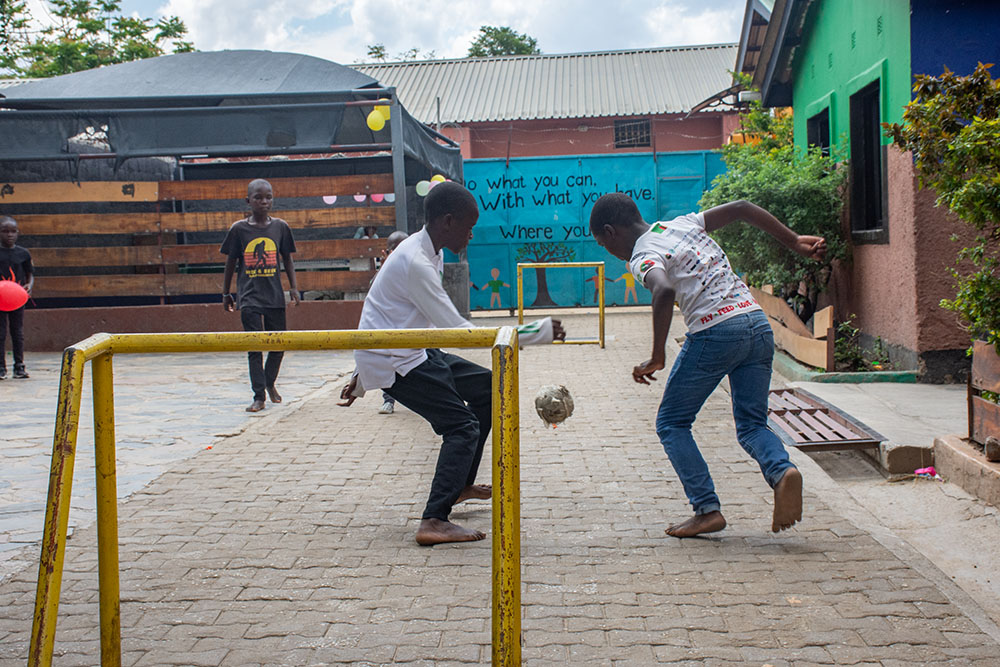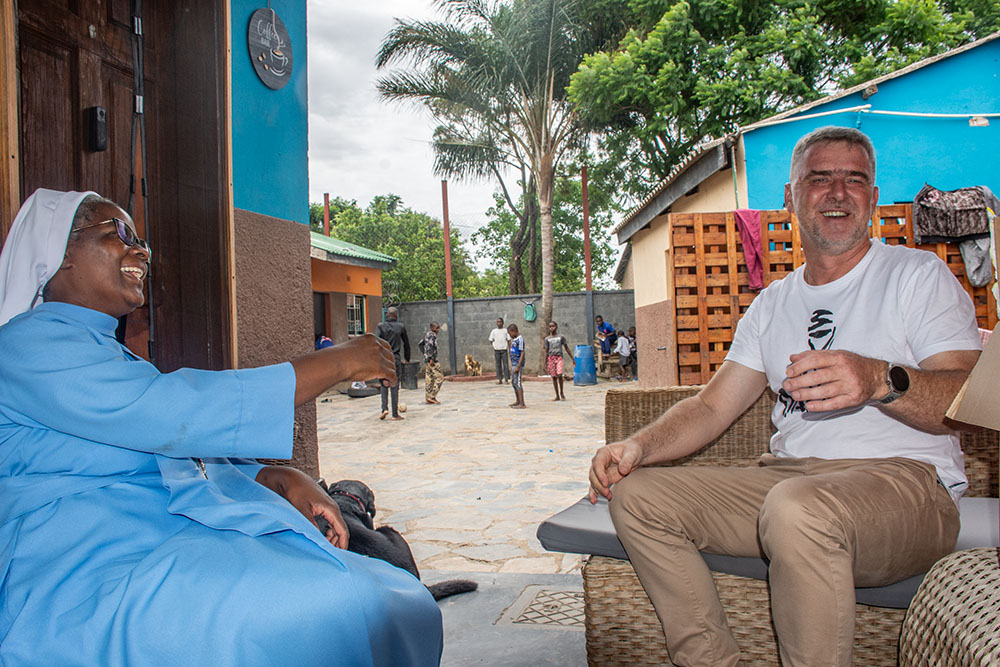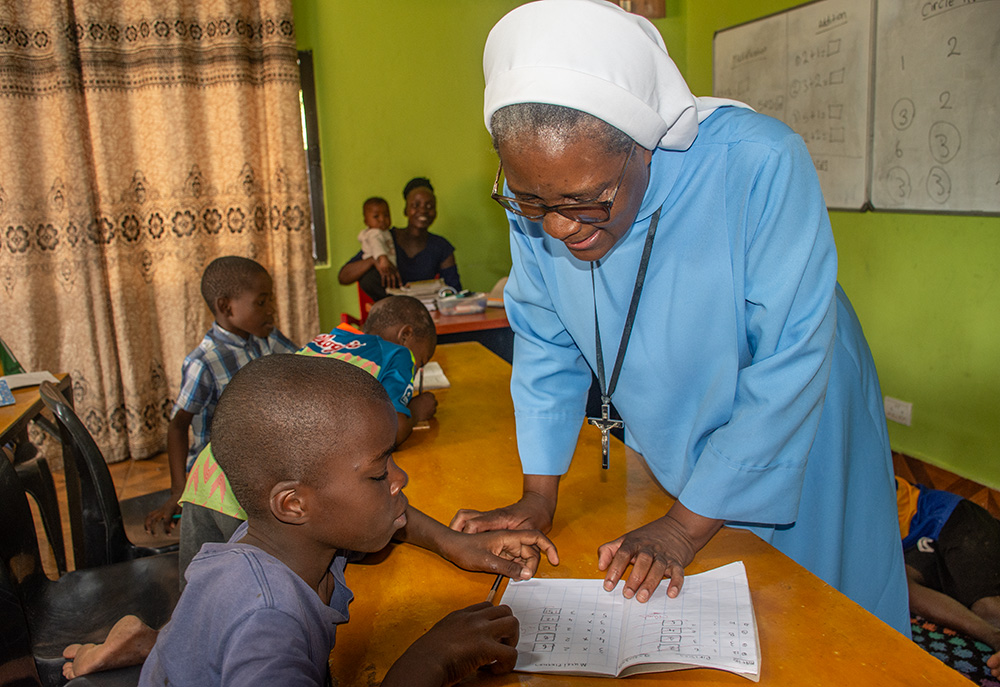
Young boys enjoy a game of soccer during their spare time at St. Lawrence Home of Hope in Lusaka, Zambia. (Derrick Silimina)
One morning in early 2003, Missionaries of Africa Br. Jacek Rakowski felt overwhelmed after he found a young boy lying down along one of the sprawling shopping corridors of Zambia's capital.
Rakowski, now the director of St. Lawrence Home of Hope, had been in Zambia less than a week and was disturbed because he had never seen homeless children in his home country, Poland.
"I didn't know what to do next, but after I went back to my community, my conscience troubled me," he told Global Sisters Report.
The following day, Rakowski found the same boy lying in the same spot. Moved with compassion, he realized something was wrong and bought him a meal despite the language barrier. Despite his missionary calling, dealing with street children was never part of his plans.
"I took him by hand, and I went to an eatery along Lusaka's main Cairo road and bought him some hamburgers, and we parted," he said.
The Missionaries of Africa, an international missionary society of priests and brothers, established St. Lawrence Home of Hope in 1998 for neglected, traumatized and abused children who require care, protection and therapeutic intervention.
In collaboration with the Zambia Association of Sisterhoods, the sisters of the Little Servants of Mary Immaculate have also been helping children at the facility to escape neglect, homelessness, physical and sexual abuse, and drug addiction.

Sr. Catherine Mpolokoso of the Little Servants of Mary Immaculate and Br. Jacek Rakowski of the Missionaries of Africa share a light moment at St. Lawrence Home of Hope in Lusaka, Zambia. (Derrick Silimina)
"We want to withdraw them from the street before the trauma happens because kids reach a point of no return if they stay too long on the street. If left unchecked, it damages their psyche, body and identity, and later drug addiction kicks in," Rakowski said.
Just like other vulnerable kids who crowd Zambia's street corners for handouts, Amos Zulu (not his real name) was filled with fear. One frigid night, he lay awake on his thin sponge mattress wondering how to relocate to another township from Lusaka's notorious slum of Chibolya, a renowned hub for drug trafficking, alcohol abuse and burglary, among other illicit activities, where even the police do not dare to tread.
"I fled from my uncle's house at the age of 12 after I endured physical and mental abuse. I then joined a gang of drug dealers in our neighborhood to earn a living," Zulu told GSR.
Zulu, 15, eluded police arrest and realized how dangerous drug dealing was. The fierce anti-drug security crack squad made him quit drug trafficking and go to St. Lawrence Home of Hope.
"I feel safe and liberated now after I came here through the child protection unit. With the sisters' therapeutic interventions and support from [the] management of this facility, I now live my life anew."
Advertisement
The Missionaries of Africa began the center as a "Street Children Project" but later renamed it a "Children-in-Street Situation."
"Once you are labeled as a street kid, it doesn't matter how much you have changed, how good a person you are, or how many diplomas you have, as that name will follow you for the rest of your life," Rakowski explained.
The residential home for boys offers children a new start and reintegrates them into their families, homes and society while helping them regain their childhood, confidence and dreams.
"We undertake various counseling activities at this facility to help the boys understand who they are, where they come from and help them become resilient despite what they face in life," said Sr. Catherine Mpolokoso of the Little Servants of Mary Immaculate.
Mpolokoso, the Zambia Association of Sisterhoods project coordinator, added that staff at the facility have benefited from capacity building through training to enable them to undertake their humanitarian work.
She explained that her congregation's charism, "To reach out to the vulnerable, the children and those who are rejected by the society in ensuring that human dignity is upheld," is paramount to uplifting the lives of humanity.
Mpolokoso said that the Zambia Association of Sisterhoods has been pivotal in addressing challenges faced by vulnerable children at the facility through the Catholic Care for Children in Zambia program. The program focuses on child neglect and poverty and has managed more than 40 child care facilities since 2017, including St. Lawrence House of Hope.

Sr. Catherine Mpolokoso of the Little Servants of Mary Immaculate conducts lessons for young learners at St. Lawrence Home of Hope in Lusaka, Zambia. (Derrick Silimina)
"We emphasize providing spiritual and emotional support tailored to each child's dignity. We actively work to trace families, communicate with them, and facilitate reintegration if suitable," she said.
Some boys resist the educational opportunities provided and return to the streets. Those who stay often progress to secondary and tertiary education, demonstrating the program's long-term potential for positively influencing their lives.
"I help them to be resilient and understand that their circumstances are not permanent because any life crisis can be rectified," Mpolokoso concluded.
Rakowski said the organization often reaches out to kids separated from their families. They also participate in a juvenile diversion program [for] kids who committed crimes and went to court.
"The court sentences them to be here for therapy because [the] government recognizes that juveniles who come in conflict with the law need help and not punishment," he said.
The facility receives an average of 10 children per month, and more than 1,200 children have passed through it since its inception. As of January, 64 children have been reunited with their families.





